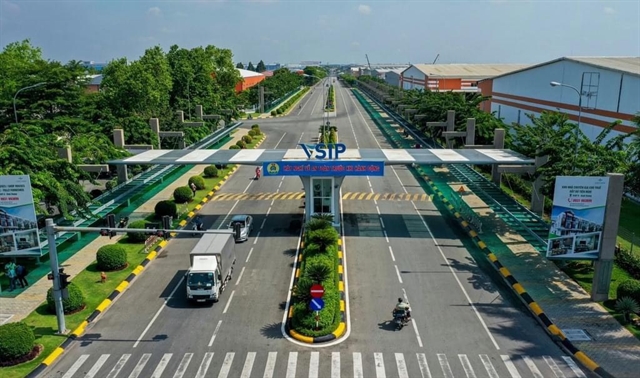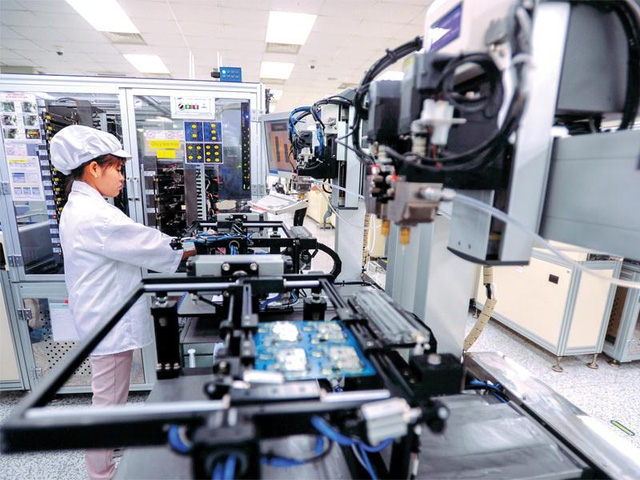 |
| The increasingly improved infrastructure in Bình Dương Province helps it become a leading locality in attracting domestic and foreign investment capital. VNS Photo Văn Châu |
BÌNH DƯƠNG – Bình Dương Province plans to invest VNĐ20 trillion (US$785.5 million) from now to 2030, with a vision to 2050, to complete infrastructure to facilitate economic development, thereby helping to increase average incomes and improve people's quality of life.
Well-developed infrastructure will be an important foundation for Bình Dương to affirm its position as a strategic economic center of the Southeast region and move towards becoming a centrally-governed city.
Võ Anh Tuấn, Chief of Office of the Provincial People's Committee, said that the province will focus on implementing 37 key infrastructure tasks with public investment capital mobilised from many sources, including land auctions and calling for investment from the private sector.
Bình Dương’s goal by 2050 is to increase per capita income to $15,000 per year. However, to achieve this goal, the province is facing many challenges, especially in terms of investment capital and budget regulation.
Previously, to partially solve the shortage of capital for infrastructure investment, the locality has proposed to the Government to borrow VNĐ10 trillion ($392.7 million) to fund critical transportation infrastructure projects.
Phạm Trọng Nhân, director of the provincial Department of Planning and Investment, said that to ensure effectiveness and feasibility, the department will provide detailed advice on specific tasks and solutions to implement the 37 infrastructure tasks in the province's plan.
Bình Dương holds a series of important events in September. The events include the inauguration of Bạch Đằng No 2 Bridge, connecting Bình Dương with Đồng Nai Province, along with the groundbreaking ceremony of key projects such as the A1 roundabout and Cây Trường Industrial Park in Bàu Bàng District.
This is an opportunity for Bình Dương to affirm its role as a center for attracting investment and sustainable economic development, while creating momentum for the province in the process of moving towards the goal of becoming a centrally-governed city.
One of the highlights of the event series was the groundbreaking ceremony of Cây Trường Industrial Park, a strategic project invested in by Becamex IDC Corporation.
This project has a scale of up to 700ha and is expected to create jobs for 35,000 workers, focusing on key industries in line with the province's socio-economic development orientation.
Cây Trường Industrial Park is expected to continue to attract domestic and foreign investors, especially businesses that are looking to relocate or expand production from neighbouring provinces and HCM City.
The construction of industrial park infrastructure not only helps the province expand its land fund for development but also creates favourable conditions for attracting high-quality FDI capital flows.
This year, the province aims to attract 130-140 investment projects to industrial parks (IP), securing $1.2-1.3 billion from foreign capital and VNĐ1.1-1.2 trillion from domestic investors.
The management board of Bình Dương Province's industrial parks reported that there are currently 28 operational IPs in this area, with an impressive occupancy rate of over 93 per cent.
This makes Bình Dương the locality with the highest IP occupancy rate in the entire country.
 |
| Bình Dương has the highest industrial park occupancy rate in Việt Nam. VNA/VNS Photo |
To date, Bình Dương's IPs have attracted 3,080 active projects. Among them, there are 2,400 foreign-invested projects with a registered capital of nearly $29 billion and 680 domestic projects with a registered capital of nearly VNĐ93.6 trillion.
From 2023 to 2025, the province has developed 10 IPs, covering a total land area of about 3,154ha.
For 2026-30, the plan expands to 19 IPs, with a total land area of around 5,537ha. This includes the completion of the ongoing development of the IPs from the 2023-25 period, covering an area of about 2,063ha, and the addition of nine new IPs, spanning 3,474ha.
These IPs will follow the "3-in-1" model, combining IPs, urban areas, and service areas. They will feature comprehensive and modern technological and social infrastructure.
The investment for these IPs will be more focused and selective, emphasising specialisation, ecological considerations and smart development. — VNS


